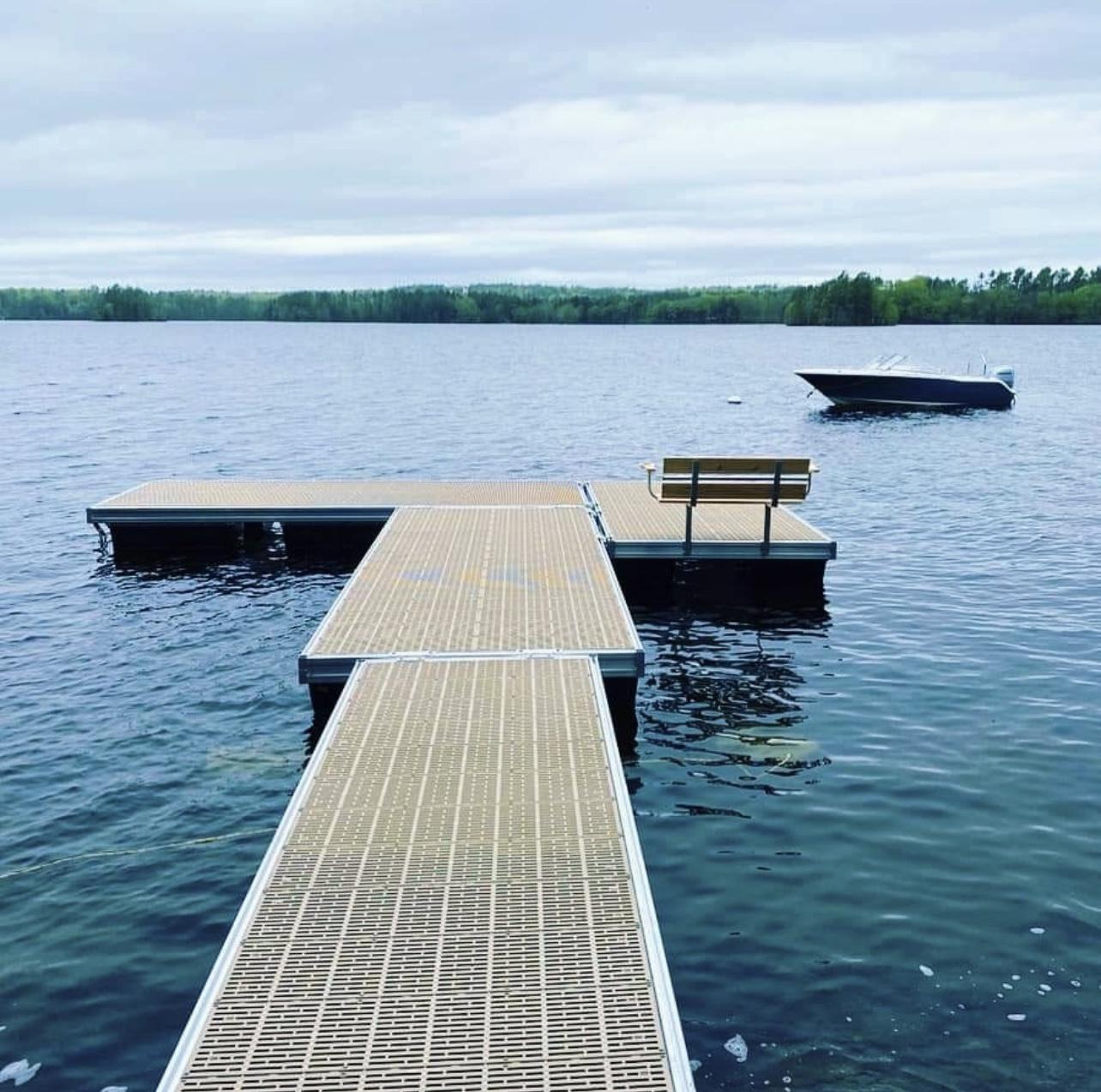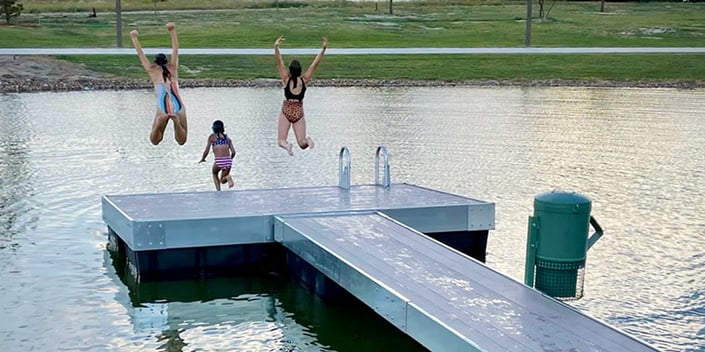Optimizing Your Outdoor Area with Specialized Floating Dock Solutions
Optimizing Your Outdoor Area with Specialized Floating Dock Solutions
Blog Article
Floating Docks: The Suitable Option for Versatile Water Accessibility
Floating docks existing a compelling remedy for a range of water accessibility needs, supplying adaptability that transcends conventional mooring choices. The modular nature of floating docks promotes modification, providing to details demands.
Benefits of Floating Docks
Floating docks deal various advantages that enhance water gain access to for various applications. Their capacity to climb and fall with transforming water levels makes them specifically helpful in atmospheres with fluctuating tides or seasonal variants. This adaptability makes sure that vessels can conveniently moor without concern for the water's depth, providing a trustworthy system for entertainment, business, and commercial usages.
In addition, floating docks are commonly built from durable products that resist corrosion, making them ideal for long-lasting use in aquatic settings. Their installation is typically much less invasive than typical fixed docks, minimizing the ecological effect and helping with quicker implementation (floating docks). This versatility allows for simpler moving or reconfiguration according to user demands or ecological modifications
Security is an additional vital benefit; floating docks can offer stable gain access to for individuals getting off or boarding from watercrafts and minimize the threat of crashes related to unpredictable surface areas. They can be developed to fit a range of accessories, such as cleats and fenders, enhancing performance. On the whole, floating docks represent a reliable option for boosting water accessibility across diverse fields while promoting safety and ecological sustainability.

Kinds Of Floating Docks
Various types of floating docks accommodate various requirements and atmospheres, each developed with specific functions to optimize functionality. The most typical types consist of modular docks, which include interlacing areas that enable easy customization and growth. These docks are perfect for recreational use, as they can be customized to fit different watercraft dimensions and water conditions.
One more popular option is the stationary floating dock, which continues to be anchored in area however floats with transforming water degrees. floating dock builder. This kind is particularly fit for areas with minimal tidal fluctuations, supplying steady gain access to for angling or swimming. Furthermore, there are drive-on docks, which feature a sloped style that allows watercrafts to conveniently drive on and off, making them ideal for individual boat and smaller sized vessels
For business applications, sturdy floating docks are offered, constructed from reinforced materials to withstand considerable loads and severe aquatic settings. Eco-friendly floating docks use lasting materials and layouts to minimize environmental influence, frequently incorporating features like plant life to sustain regional wild animals. Understanding the various kinds of floating docks ensures that customers can choose one of the most appropriate service for their particular needs.
Installation Process Overview
An effective setup of floating docks calls for mindful planning and focus to detail to guarantee optimum efficiency and safety and security. The first action includes evaluating the site conditions, including water deepness, existing, and potential barriers. This evaluation notifies the choice of the suitable dock products and style customized to the details setting.
Following, getting required authorizations is essential, as many jurisdictions have policies concerning construction on water bodies. The installment can continue once authorizations are secured. Begin by preparing the structure, which may involve anchoring systems or pilings tailored to the dock kind and local conditions.
Complying with the foundation configuration, put together the dock areas according to supplier requirements. Make certain dock company that all parts are securely fastened and aligned to hold up against environmental anxieties. Placement the dock in the designated area, guaranteeing it is level and stable.

Maintenance Tips and Finest Practices
After the installment procedure is full, recurring upkeep plays a crucial duty in ensuring the durability and functionality of floating docks. Normal inspections should be conducted to recognize any indicators of wear, damages, or degeneration - floating docks. Examine for any type of loosened installations, splits, or splitting up in the dock sections, as these can compromise architectural integrity
Cleansing the dock is essential to eliminate particles, algae, and various other build-up that can affect its appearance and safety. Use a mild stress wash occasionally to keep sanitation without causing damages to the surface area. Additionally, applying a safety sealant every couple of years can aid enhance durability and stand up to ecological wear.
Focus on the mooring lines and supports, ensuring they are cost-free and secure from corrosion. Change any degraded components promptly to prevent dangers. Seasonal changes may likewise be necessary; throughout extreme weather, reinforcing the dock or rearranging can avoid damage.
Applications for Floating Docks
Floating docks serve a wide variety of applications, satisfying both recreational and industrial needs. In recreational setups, they give seamless accessibility to rivers for activities such as boating, angling, and swimming. Their flexible nature enables installment in differing water degrees, guaranteeing secure and YOURURL.com safe accessibility no matter tidal changes.
Readily, floating docks are important for marinas and waterfront companies. They assist in the docking of vessels, allowing effective unloading and loading of products. Their modular layout permits very easy growth or reconfiguration to fit changing company needs, making them perfect for boat leasings, scenic tour procedures, or angling charters.
In addition, floating docks are made use of in environmental applications such as water study and environment reconstruction. They can function as platforms for clinical studies, monitoring water top quality, or conducting wild animals studies without disturbing sensitive environments.
In commercial contexts, floating docks are employed in construction tasks, providing accessibility to hard-to-reach areas for equipment and workers. Their convenience, resilience, and very little effect on the setting make them an optimal choice for a variety of applications, improving both functionality and access in various water-based atmospheres.
Verdict
Finally, floating docks represent an optimum solution for varied water access needs, owing to their adaptability, sturdiness, and modular layout. These frameworks help with risk-free mooring for numerous applications while lessening ecological impact throughout installation. The decreased upkeep requirements further improve their functionality. As such, floating docks serve as a useful possession for recreational, commercial, and ecological jobs, making sure dependable accessibility to waterways and promoting lasting techniques in marine settings.
Floating docks existing a compelling solution for a selection of water access needs, offering adaptability that transcends conventional mooring options.Floating docks deal various benefits that enhance water accessibility for different applications. In general, floating docks stand for a reliable remedy for improving water gain access to across varied industries while advertising safety and environmental sustainability.
One more prominent choice is the stationary floating dock, which remains anchored in place find more info but drifts with changing water degrees.In verdict, floating docks stand for an optimal service for diverse water gain access to requires, owing to their versatility, toughness, and modular style.
Report this page